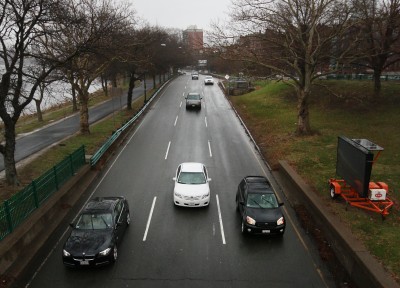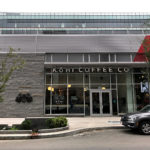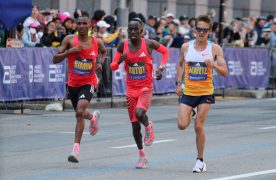
The Massachusetts Highway Safety Division received a grant of $622,000 from the National Highway Traffic Safety Administration to increase police efforts to crack down on distracted driving beginning Friday, according to bureau director Jeff Larason.
Larason discussed the prevalence of distracted driving and the reasons behind this new effort.
“There seems to be a notion with drivers that it is OK for people to use their phones while at a stoplight,” Larason said. “That is neither safe nor legal. And this isn’t just a problem with teen drivers, this is also a problem with adult drivers as well.”
Larason also explained the new methods police will take to reduce the number of distracted drivers on the road.
“One method is that they will have a spotter who is stationed at the side of the road who will call to other police officers who are further down the road and let them know that they’ve spotted a distracted driver,” Larason said. “It is then those police officers who will flag down the driver.”
According to the official U.S. government website for distracted driving, 3,179 people were killed and 431,000 people were involved in crashes involving distracted drivers in 2014. The website stated that an increase in police activity will ensure that there are fewer deaths and accidents.
Larason shared that the main goal of the program is to raise awareness about distracted driving and to put a stop to the harm it causes.
“The hope will be that people understand that this is not socially acceptable and that we will start to reduce the numbers of people who end up in distracted driving crashes,” Larason said. “It’s up to the police to do that and for the police to enforce effectively.”
Rachel McGuire, spokesperson for the Boston Police Department, said it’s still uncertain if the BPD will be a part of the program, but it has already started to target distracted drivers by giving them written or verbal warnings on a regular basis.
“The fine for a distracted driver is $100,” McGuire said. “The Boston Police Department, while we do give out citations, focuses mostly on education and providing resources to end distracted driving.”
Emily Stein, president of the Safe Roads Alliance, discussed the group’s enthusiasm for the new program.
“We are very excited for the program to go underway,” Stein said. “Here at Safe Roads Alliance, our main goal is to provide educational resources to both new and experiences drivers.”
The Safe Roads Alliance gives information packets about safe driving to all new drivers when they acquire their learner’s permit, Stein said.
Stein also discussed how hands-free technology has made it harder for police to catch distracted drivers.
“Hands-free technology is now our biggest issue because too many people think that it’s OK to use while driving, whereas statistics show that it is just as distracting as using a handheld phone or even texting,” Stein said.
Several Boston residents had mixed opinions about the program.
Etta Anderson, 67, of Allston, said Boston drivers can be overly aggressive.
“I only use Boston’s public transportation systems, but I’ve become more and more afraid to cross the streets here,” she said. “Boston drivers are already aggressive enough as it is, and with everyone on their smartphones, it’s only become scarier.”
Sam Brooks, 43, of Beacon Hill, said he and his family try to not to distract each other when they are on the road.
“My wife and I use a touchscreen speakerphone built into our car to communicate on the road, but we try and keep the conversations short,” he said. “I don’t want to endanger her by calling her when she’s driving, and I certainly don’t want her to end up with a ticket.”
Laura Peters, 25, of Back Bay, said she avoids technology when she drives because of how reckless drivers can be.
“When I was a student in Boston, I never drove anywhere,” she said. “But now that I live on my own, my roommates and I share a car. I couldn’t imagine being on the phone while driving here, because drivers are already aggressive as it is and I’m just trying not to wreck our car.”














